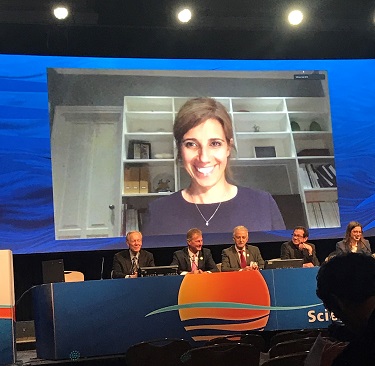ORBITA Continues to Surprise: 85% of Sham Arm Opted for PCI When Trial Ended
A discussion here at SCAI tackled lingering ORBITA issues, with experts finally grasping a detail the PI says she’s been emphasizing from the outset.

SAN DIEGO, CA—On the first day of the SCAI 2018 meeting, a session that was supposed to be devoted to controversies over the management of CAD was completed dominated by just one subject: the ORBITA trial.
In a lively session moderated by Morton J. Kern, MD (University of California, Irvine), a panel of interventionalists fielded questions from one another and from the audience about ORBITA, which was presented last year at TCT 2017 by Rasha Al-Lamee, MBBS (Imperial College London, England). The study kicked off a storm of controversy that continues to rage among interventionalists when it showed no difference in exercise capacity and angina symptoms at 6 weeks among symptomatic patients with single-vessel disease randomized to PCI or placebo.

Skyping into the session from London, where she joked that she was too far away for anyone to punch her in the face, Al-Lamee noted that after the 6-week period of the study ended, 85% of patients randomized to the placebo arm underwent PCI. “We have always said that the vast majority of patients in the placebo arm went onto have PCI and no longer-term trial follow-up is planned,” she told TCTMD via email. “I guess people weren’t always listening.”
At SCAI, Al-Lamee explained that when patients were enrolled into the trial, they were told that when the study was unblinded they would have an in-depth conversation with their physician and decide together what their next step would be, with their preference taken into account.
SCAI President Kirk Garratt, MD (Christiana Care Health System, Newark, DE), asked Al-Lamee if she had any sense of how many of those patients who elected to have PCI did so because they were tired of taking medical therapy. Noting that it was a reason for some, Al-Lamee offered anecdotal explanations such as a patient who told her the medications were “worse than chemo.” Another told her that the amount of medications being taken impeded ability to exercise. The average number of antianginal medications that ORBITA patients were taking in the control arm was three.
Al-Lamee conceded that in trying to optimize medical therapy and adhere to clinical guidelines “perhaps we overreached.”
But panelist Spencer B. King, MD (Emory University School of Medicine), said a more important message the placebo group may be sending is that they are afraid of dying. “Patients know they have a blocked artery and we, when giving informed consent, are really in a box trying to explain to people this has nothing to do with survival,” he said.
Even so, Garratt said the reasons people stop or refuse to comply with prescribed medications are complex. He cited the recent ARTEMIS study, where even when vouchers were given to patients to reduce the out-of-pocket costs of P2Y12 inhibitors there was no impact on clinical events.
Was the Sham a Sham?
Panelist Allen Jeremias, MD, MSc (St. Francis Hospital, Roslyn, NY), remarked that given the high rate of patients choosing to get off medication and have PCI, ORBITA may have ended up being a positive trial if follow-up had extended longer than 6 weeks.
Noting that it was a “very valid point,” Al-Lamee acknowledged that over time it might be expected that the placebo effect so clearly on display in ORBITA may wear off.
Kenneth Rosenfield, MD (Massachusetts General Hospital, Boston), offered an interesting insight into the trial, which addressed why patients would even have agreed to enroll in ORBITA. Due to the protracted process involved in getting PCI in England, those enrolled in the placebo arm for 6 weeks conceivably may have had a shorter wait for PCI than if they hadn’t been consented. Since they knew they had the option of PCI at the end anyway, he added, being randomized to the sham group may not have been such a big deal after all.
Other panelists agreed that the explanation goes a long way toward countering critics who have said it was unethical to enroll patients in a sham-controlled PCI trial. Al-Lamee noted that another aspect that seems to have kept patients engaged and agreeable to being in the trial was something she referred to as the “ORBITA Love Effect.” Two or three times a week patients received phone calls from physicians in which they discussed how they were feeling and had their medications changed as needed. That strategy, combined with knowing they could have revascularization if they wanted it, may be another clue to the unlikely success the ORBITA researchers had in recruiting patients into their trial.
Toward the end of the session, Kern asked the panel their thoughts on the potential implications of ORBITA on clinical guidelines. All agreed that any impact would not be with regard to changing treatment recommendations.
“I would hope that what should come out of this is the empowerment of shared decision-making and informing patients, . . . that it’s okay not to have an intervention based on some data that are very high quality,” Rosenfield said.
“I don’t think any one trial changes guidelines,” Al-Lamee added. “If ISCHEMIA is negative, maybe we should have that discussion again. It would be nice if we . . . practiced the guidelines that exist.”
L.A. McKeown is a Senior Medical Journalist for TCTMD, the Section Editor of CV Team Forum, and Senior Medical…
Read Full BioSources
Controversies in interventional cardiology I: interventional management in stable coronary artery disease. Presented at: SCAI 2018. April 25, 2018. San Diego, CA.


Comments